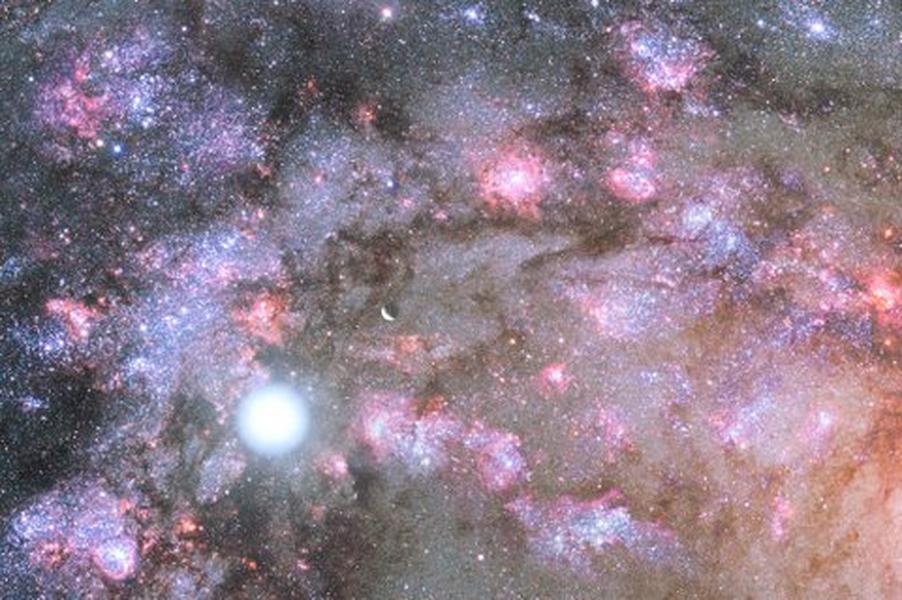'We finally found it': Scientists get first look at 'monster' galaxy's formation


A free daily email with the biggest news stories of the day – and the best features from TheWeek.com
You are now subscribed
Your newsletter sign-up was successful
Yale astronomers have at last gotten a first look at the formation of "the universe's monster galaxies," Phys.org reports, and the results are fascinating.
The research, which used data from NASA's Hubble Space Telescope, NASA's Spitzer Space Telescope, ESA's Herschel Space Observatory, and the W.M. Keck Observatory in Hawaii, was published Wednesday in the journal Nature. It marks the first time astronomers have seen the earliest stages of a massive galaxy's formation.
The Keck II telescope's Near Infrared Spectograph allowed the astronomers to watch the galaxy — officially called GOODS-N-774 but nicknamed "Sparky" — produce massive amounts of stars. Witnessing this formation gave them new insight into how ancient galaxies may have formed 11 billion years ago — only 3 billion years after the Big Bang.
The Week
Escape your echo chamber. Get the facts behind the news, plus analysis from multiple perspectives.

Sign up for The Week's Free Newsletters
From our morning news briefing to a weekly Good News Newsletter, get the best of The Week delivered directly to your inbox.
From our morning news briefing to a weekly Good News Newsletter, get the best of The Week delivered directly to your inbox.
The scientists found that Sparky's formation is unique to the early universe that it developed in: its rapid gas movement was often violent, and it produced as many as 300 stars per year — an astounding amount of stars, especially considering its relatively tiny size (it measured roughly 6,000 light-years across). The Milky Way, by contrast, only produces roughly 10 stars annually, but spans 100,000 light-years.
"I think our discovery settles the question of whether this mode of building galaxies actually happened or not," said Pieter van Dokkum, one of the Yale astronomers. "The question now is, 'How often did this occur?' We suspect there are other galaxies like this that are even fainter in near-infrared wavelengths. We had been searching for this galaxy for years, and it's very exciting that we finally found it." --Meghan DeMaria
A free daily email with the biggest news stories of the day – and the best features from TheWeek.com
Meghan DeMaria is a staff writer at TheWeek.com. She has previously worked for USA Today and Marie Claire.
-
 6 of the world’s most accessible destinations
6 of the world’s most accessible destinationsThe Week Recommends Experience all of Berlin, Singapore and Sydney
-
 How the FCC’s ‘equal time’ rule works
How the FCC’s ‘equal time’ rule worksIn the Spotlight The law is at the heart of the Colbert-CBS conflict
-
 What is the endgame in the DHS shutdown?
What is the endgame in the DHS shutdown?Today’s Big Question Democrats want to rein in ICE’s immigration crackdown
-
 Blue Origin launches Mars probes in NASA debut
Blue Origin launches Mars probes in NASA debutSpeed Read The New Glenn rocket is carrying small twin spacecraft toward Mars as part of NASA’s Escapade mission
-
 Dinosaurs were thriving before asteroid, study finds
Dinosaurs were thriving before asteroid, study findsSpeed Read The dinosaurs would not have gone extinct if not for the asteroid
-
 SpaceX breaks Starship losing streak in 10th test
SpaceX breaks Starship losing streak in 10th testspeed read The Starship rocket's test flight was largely successful, deploying eight dummy satellites during its hour in space
-
 Rabbits with 'horns' sighted across Colorado
Rabbits with 'horns' sighted across Coloradospeed read These creatures are infected with the 'mostly harmless' Shope papilloma virus
-
 Lithium shows promise in Alzheimer's study
Lithium shows promise in Alzheimer's studySpeed Read Potential new treatments could use small amounts of the common metal
-
 Scientists discover cause of massive sea star die-off
Scientists discover cause of massive sea star die-offSpeed Read A bacteria related to cholera has been found responsible for the deaths of more than 5 billion sea stars
-
 'Thriving' ecosystem found 30,000 feet undersea
'Thriving' ecosystem found 30,000 feet underseaSpeed Read Researchers discovered communities of creatures living in frigid, pitch-black waters under high pressure
-
 New York plans first nuclear plant in 36 years
New York plans first nuclear plant in 36 yearsSpeed Read The plant, to be constructed somewhere in upstate New York, will produce enough energy to power a million homes
